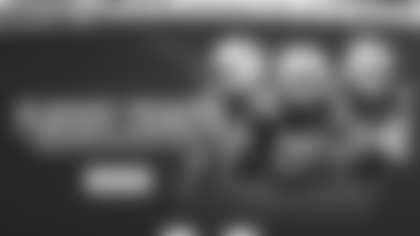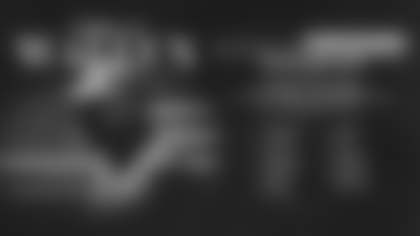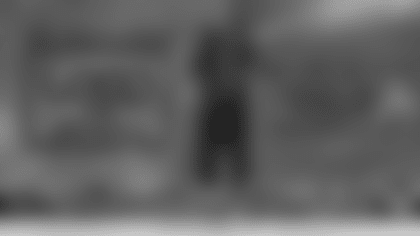April 21, 2011
VICE CHAIRMAN BILL POLIAN (opening statement) Friday, April 22, 2011
"Good morning. This is our annual pre-draft press conference, for us a little bit like a trip to the dentist, but we recognize that it's something that is important to you. On my right is Tom Telesco, our director of player personnel. On my left, Chris Polian. We thought it was really both appropriate and meaningful for them to have an opportunity to talk with you and answer your questions as best they can. This is a little bit unique in that we can't say anything about the lockout, except that it is on-going. It's not appropriate for us to address any of the issues that have taken place in Minneapolis or elsewhere regarding the labor situation. We have had no contact and don't intend to have any contact with any of our players, so we can't give you any updates on anything that is happening with any of them because we simply don't know. We don't think it's appropriate to comment on any player who is presently on our roster from a contractual standpoint or anything of that nature, because that is all tied up in the labor situation. I'll beg your indulgence on that one.
"I thought, to just start off, I'd give you a little overview on our draft philosophy, and these two gentlemen who have been intimately involved with the process for the past year can talk with you and answer questions about how we implement it and how it works. The definition of what we do, or the foundation of what we do, is best described by both Marv Levy and Bill Walsh, two Hall-of-Fame coaches who said the purpose of the draft was to acquire players for your team, nothing more, nothing less. It's become, from a public standpoint, a great deal more since I first became involved with it in 1977, but it still for us does not change the central purpose of what we do. It's to acquire players. And so in order to do that, we've established a system that is really about 20 years old. The origins of it came about in Buffalo with John Butler, Bob Ferguson and myself putting together a sort-of forerunner of what we have today. When these gentlemen (Chris Polian and Tom Telesco) and Dom Anile and I got together in Carolina in 1995, we began to refine it and then when all of us came here in 1998, we really had the basis of everything that we now do in place. Both Tom and Chris over the years have added significantly to it, in terms of the use of computers, the establishment of metrics and things of that nature. We now have a system that we trust completely. We work 365 days a year, so while many of you because of the demands of your job don't begin to focus on the draft until the combine begins, we begin focusing on the draft, or will begin focusing on the draft, the Monday following the draft. We trust the system, it has been successful for us and that's how we operate.
"It's a process. We're trying to evaluate the physical ability, performance, mental ability, emotional status and system fit for every draft-eligible collegiate player in the country. That is a tall order. Our scouts do a magnificent job of getting out there in the field and providing the data that is necessary to make that evaluation. Their evaluations carry great weight. We've rarely moved players on the board very much at all from the grades that the scouts have established in December, and when we have in the past we've made mistakes. So we're a little more conscious of that now. We trust the system, we trust the people who operate the system, they do a great job for us, and we feel that everything that we do in player acquisition is based on that system. Now, much of what we do does not comport with conventional wisdom, and we understand that. I guess 'conventional wisdom' is a poor term. It does not comport with the theories that are out there in the media, and that's fine. The combine has become a big thing because it is on television. A lot of people see it, and we drafted a player a year ago who wasn't at the combine and people questioned that. How could you draft a player that wasn't at the combine? Well, all the combine does is provide us with data. We had the data from another source, our on-campus workout. There are certain myths that have grown up around the draft that we don't necessarily subscribe to because they don't comport or fit with our system. There is nothing wrong with them, but we simply don't place a lot of value on things outside of our system.
"The final piece in that puzzle is that we have a philosophy, you go back to the original definition that the draft and collegiate free agency, which normally follows it and won't this year, provides us with players. Therefore the player in the first round is no less important than the last collegiate free agent you sign because any and all can provide the winning edge. I recognize that everybody follows the first-rounders and that's fine, but that's not the way we look at it. For example, Melvin Bullitt is every bit as important as a player you drafted early because he ends up being a major contributor to a championship team. The names go on and on: Austin Collie, Kavell Conner, David Thornton, Dominic Rhodes, Robert Mathis, Jeff Saturday, Gary Brackett, and I apologize to those other great players that we've drafted lower than round one who I have not included here. In order to have a successful draft, it isn't just one round or just two rounds that are important. It is the whole thing top-to-bottom. We put in as much or more work, in fact a great deal of more work, on the backend of the draft than we do on the top. I recognize that everybody focuses on the top and that is fine, but you can't just draft one player.
"The final thing is people tend to think every draft should produce a starter in every round, a couple of Pro Bowl players, that you should be infallible. That isn't the case at all. It isn't possible to do that. In fact, if you look at a draft after three years, which is the minimal amount of time you can tell if it has been fruitful, you end up really saying if you have four players from any given draft who reach free agency and who have contributed to winning then you've had a successful draft. Over 25 years that I've been compiling statistics, that number has always remained the same. If you hit on four players who contribute to winning in every draft you're usually going to end up in the playoffs and be pretty successful. The caveat there is that if you have a high number one (selection), meaning a number one in the top-15 picks, if you miss on one of those because of the price penalty involved, the financial penalty involved in a salary cap system, that's pretty hurtful. That's hard to make up for. It's not impossible, teams have done it, but it just makes the job that much harder. That's the overview. That's the philosophy ever since we've come here. We tweak it year-in and year-out, and we'll begin in May to do our own internal critiques and work with metrics and things like that to make sure we stay current. That's an on-going process, but the philosophy and the bedrock is one we trust and one that we're going to continue to stay with."
VICE PRESIDENT AND GENERAL MANAGER CHRIS POLIAN (on if the uncertainty in the NFL has altered anything in the draft process) Friday, April 22, 2011
"It's just a little bit different for us. In our particular situation, we would have re-signed some of our own free agents at this point. As everybody knows, we have not been overly active in the free agency market in terms of bringing in people from other teams. I think that may be a dynamic that is different for other clubs. For us, the difference is we don't know the status of our own players at this point. But in terms of entering that into the draft planning, we have not done that. We have treated the draft like we would have any other year. The uncertainty of what the situation is when things resume, all 32 clubs will have to deal with that. We'll be dealing with it after the draft rather than before the draft in past years. That's really the biggest change."
VICE PRESIDENT AND GENERAL MANAGER CHRIS POLIAN (on with not knowing the status of their own players do they take the approach that they aren't going to be back, but if they are, good for us) Friday, April 22, 2011
"I don't think we've taken either approach just because we don't know what it is. All of our discussions, whether it be internally amongst ourselves or with the coaches, we're in the same boat as 31 other teams. We don't know what our roster looks like at this point. Everybody is going to have to be flexible as we move forward. It's uncharted territory."
VICE CHAIRMAN BILL POLIAN (on how hurtful it might be that come the Saturday when the draft ends that teams cannot sign undrafted free agents) Friday, April 22, 2011
"Well, it is what it is. Obviously, it has been a big part of what we do. You'd like for it to be otherwise, but that is not the case. We'll just deal with the reality of it."
DIRECTOR OF PLAYER PERSONNEL TOM TELESCO (on how hurtful it might be that come the Saturday when the draft ends that teams cannot sign undrafted free agents) Friday, April 22, 2011
"We've prepared for it the same way because we really didn't know going forward what was going to happen. The preparations for those guys, everything has been exactly the same. If we can't do anything immediately after the draft we may have to scale it down a little bit because at some point we will be able to sign those guys, we just don't know when. Like Bill said earlier, we do put a lot of work into those guys. We have specific meetings set up to work on those late- round guys and college free agents. So the process has been the same. We've typically signed between 15 and 18 of those kids in the past, maybe a little smaller this year, but we'll have them ranked and ready to go whenever that time comes and we're allowed to start signing."
VICE CHAIRMAN BILL POLIAN (on not judging a draft class until at least three years have passed) Friday, April 22, 2011
"You can't judge a draft or judge a player's performance until at least three years. In some cases, the player might have been set back by injury, so you might have an incomplete picture even there. I would point you to Fili Moala for an example. Most people would have considered his rookie year non-descript. That's because defensive linemen and offensive linemen, along with quarterback, are the toughest positions to come in and play right away. The change in technique, the change in difficulty of the position, the change in the length of the season, the ferocity of the hitting, all of that makes it very difficult for those players to come in and play. Mike Pollak, as an example, lost virtually his entire rookie year and his entire off-season following his rookie year, which is the most important off-season of a player's career, to injury. He's an example of a guy that has been set back by injury. Now, injuries happen and that's part of the equation, you can't deny it. We have to have patience. We recognize that others don't have to and therefore don't. That's okay, but in order to make sure we do the right job, we have to have patience. But you also have to make some very serious and objective judgments at the end of that time. In Tony Ugoh's case, unfortunately because of injury and the inability to come back off that injury and play at a high level, we unfortunately had to let him go. There's no two-ways about the fact that it didn't work out, but that's part of the process. You are not going to hit on everyone. Mike Pollak has been a really good contributor. We don't have any complaints about that. He hasn't reached the level of Melvin Bullitt for example or Austin Collie or someone of that nature, but he has been a very good contributor at a position that doesn't get a lot of notoriety, so no complaints along those lines. But you can't sugarcoat a miss either. You have to recognize it and if it's a mistake, rectify it."
VICE CHAIRMAN BILL POLIAN (on if the lockout this spring is going to have a negative effect on last season's rookies as they prepare for their second season and why is the summer after a player's rookie season the most important) Friday, April 22, 2011
"Yes, the fact that they are not here probably does not allow them to progress as fast as they otherwise would. First of all, when a player first gets here as a rookie he is overwhelmed by the complexity of the system, the length of the season, the ferocity of the hitting and just the adjustment from going to college into a work environment, which this is. Professional football is a job. We often kid about the fact that when they get here they are so confused that they can't find their way from the locker room to the chow hall. Most of them master that pretty quickly. Also there has been lots of talk about the so-called 'Rookie Wall,' and it's real. Now it may not show itself in performance necessarily. You may not see it on Sunday, and the fans may not see it on Sunday in a very discernable way, but we see it around the building everyday because by Thanksgiving in the previous year in terms of work, they had played a full season of college football, played their bowl game, had their off-season program and had spring practice, that's the number of practices they would have had at the college level by Thanksgiving here. They walk around here exhausted. It's hard to even get your feet on the ground as a rookie in this league. Everything is too fast, everything is stressful and our coaches do a great job of adapting to that. Coach Caldwell has done a great job of adapting to that. We recognize that is an issue, a major issue for them. Then they get a break, come back in the off-season and sit down with their position coach and begin to learn the bedrock, the basis of NFL football. Some of our coaches call it 'Football 101.' They begin to teach them the basics, which they haven't gotten as rookies because everything moves so quickly. Secondly, they go into the weight room. They work with our strength and conditioning staff and they develop the armor, if you will, to go through a full season. Finally, they are out on the field with their teammates, executing at a slower pace, with a better understanding in a physically rested state, the techniques that they have struggled with as rookies. You hear players frequently say in their second year in the game that it has, 'slowed down.' And in fact it does. Simply because they are more adept at recognizing what is happening to them, what is happening around them, and they are more physically capable of handling the grind of the NFL. We believe as firmly in that growth process as we do our scouting system that we outlined for you at the onset."
DIRECTOR OF PLAYER PERSONNEL TOM TELESCO (on the team researching undrafted free agents as closely as first round picks) Friday, April 22, 2011
"Like Bill said, from the first round all the way down to the last free agent, they probably get an equal amount of work. It's a long process. We call it a year-long process. But in reality it's really, in essence, 13 months because this month alone we've got our scouts on the road at pro days and doing private workouts, but they are also getting ready for next year's draft this month, talking to coaches, getting their lists together, formulating the players to look at on tape this summer to get ready for the fall. We go through our meeting process, and we have different groups of meetings throughout the year, with our big meetings being really August, December and February. But we put the same amount of work into those guys, the same tape work, the same background because those guys are important to us. Every pick has a chance to come in and help us win games. We do have specific meetings, usually December for the late-round and college free agents and hit on those guys hard, and then do the same thing in the spring, getting our guys out and working these kids out and meeting them and getting background information on them to make sure they fit us."
VICE PRESIDENT AND GENERAL MANAGER CHRIS POLIAN (on the team possibly looking for offensive line help in the draft) Friday, April 22, 2011
"First of all to repeat, you can look at any position on this team and say we're filling a need. That's been a large theory of how we move forward in the draft and the strategy process of the draft. Anybody can come in and help us at a lot of different positions. Tony (Ugoh) is not here and that did not work out, so obviously that has set us back. That's the reality of that situation. We have gotten older at some positions. We are in the process of trying to mold that group together. There have been injury problems. There have been missed evaluations. As a result, it remains an area that will be a work in progress, but we can also say that about other position groups as we move forward as well."
VICE CHAIRMAN BILL POLIAN (on if this year's draft is deep at any position and how does that affect their strategy when drafting) Friday, April 22, 2011
"I don't know that it necessarily impacts our thinking. We set up our board based on our parameters, so I'm not sure that depth or lack thereof is a real concern. I'll let (Director of Player Personnel) Tom (Telesco) speak to the overall quality, but it's important to remember that when you make judgments now you're doing two things. You're judging them against their peers, that's one thing. Then you're trying to project them into the National Football League, that's quite another. That's the difficulty of the task. That's where some of the misinformation flys around out there."
DIRECTOR OF PLAYER PERSONNEL TOM TELESCO (on if this year's draft is deep at any position and how does that affect their strategy when drafting) Friday, April 22, 2011
"Depth of positions is all kind of relative. There could be six blue chip quarterbacks, but if you pick 30th it's not a deep draft for you, but if you pick 12th, it's real deep. It's all kind of relative to where you are each round and what position is there. This draft, it's a pretty good senior class all the way across the board. I'd say defensive line is probably the strongest of the group and quarterbacks is probably a close second. Defensive line, and it's both defensive ends and tackles and both 3-4 ends and 3-4 nose tackles and 4-3 tackles and ends, it's a big group and a deep group. I'd say quarterback, as well. It's probably one of the better senior quarterback groups that we've seen in eight, nine, 10 years, and you add in a couple of juniors that come out and makes it stronger. The quarterback group, you're looking at four, five, six players who were four-year starters and took a lot of snaps and won a lot of games, and (they're) all really good intangible and character guys, leaders. Usually you don't get that in the draft. Usually quarterback is the hardest to find, but this year it's a little bigger group than usual, and it's a bigger senior group, which is great because you know you're going to get a kid that's played a lot of football. At least this draft, and I think it's strong overall, but those would be the two spots that are the strongest."
VICE PRESIDENT AND GENERAL MANAGER CHRIS POLIAN (on the quarterbacks in this draft class possibly causing a lot of moving on draft day) Friday, April 22, 2011
"It's a premium position, so people are maybe willing to be a little more aggressive to get players at that position. As you look at the mocks (drafts) and you try to put together team needs and those things, that is setting up as the position to probably cause a lot of action."
VICE CHAIRMAN BILL POLIAN (on when a drafted player doesn't turn out as planned how does that hamper the team's plan) Friday, April 22, 2011
"In a lot of cases because the scouts under Tom's direction, and Dom's direction before Tom stepped into the role, have done such a great job, we haven't missed much of a beat. For example, Tom's favorite guy in last year's draft, (OT-Jeff) Linkenbach stepped in and played pretty well. Even if you miss on a high-rounder early and you get a late-rounder or a collegiate free agent who steps in and play, by Bill Walsh and Marv Levy's standards, the result is still the same. That's what you have to do. That's why we concentrate so much on the whole process. We realize we're not infallible. We're going to make some mistakes and fate is going to intervene in certain areas, i.e. injury and things of that nature. You have to be able to create a body of players who come in and help your team. Another example is Austin Collie. He goes down with injury and Blair White steps in and plays. Blair White was a collegiate free agent. That's why we spend so much time on the process. That's why we try to educate the fans through the media so much about the fact that it's the whole process that counts, not just the first round of the first day."
VICE PRESIDENT AND GENERAL MANAGER CHRIS POLIAN (on the team working out quarterbacks in preparation for this year's draft) Friday, April 22, 2011
"We have gone out as has been reported and worked out some quarterbacks, which has been a little bit different for us. We've had the luxury for a while to say we're set at the position for the foreseeable future. One part about the draft process is that it gives you the ability to evaluate players both on the field and off the field. We don't have that ability in pro scouting. You can only watch tape in pro scouting. What we do in the draft, and what our scouts provide us, is the foundation for the organization's opinion and value of the player until such time he defines himself as a pro. The college scouting report is always carried over with the player. We just felt where we had some guys on the board and where we're at in terms of looking towards the future, it was probably wise to take advantage of the opportunity the draft process gives you in terms of knowing people. Sometimes you choose to do that for this particular draft, and you can also choose to do it to build up your information as you move forward for some possibilities down the road. A lot of what we do in the draft, a lot of what the scouts do in the draft is not just necessarily for the draft at all. It carries forward. We're just making sure we take advantage of the opportunity to get to know as many players as possible. One thing I do need to add, we work a lot of players out, our scouts and coaches. It just some gather a little bit more attention media-wise than others. There have been a lot of workouts, not just a couple and that's been at various positions."
VICE CHAIRMAN BILL POLIAN (on the team working out quarterbacks in preparation for this year's draft) Friday, April 22, 2011
"That answer provides a lead-in to something I guess I should have said before. You heard from Tom (Telesco), in terms of knowing the entire landscape of every player in college, he does. He works with that 12 months a year and knows exactly who everybody is and where everybody is. Chris and I, as we begin the scouting process in the fall, have an overview, but Tom knows the entire landscape. Chris's contribution to the process over the last five-to-seven years has really been the establishment and updating of all the metrics, and the establishment and updating of all the data that goes into plotting strategy, i.e. other teams needs, age considerations, things of that nature. When I said earlier that these two men have worked with the nuts and bolts of the system, they have done it for the better part of seven years working with those nuts and bolts and providing the data that drives it. They come to the positions they have now with a world of experience in helping to build the system and then helping to implement it."
VICE CHAIRMAN BILL POLIAN (on the team's philosophy of taking the best player on the board regardless of need) Friday, April 22, 2011
"We've talked about the process. We've spent over a million dollars and all of this time and energy on establishing the board. To use a phrase Dom Anile coined many years ago, 'If you don't let the board speak to you on draft day, you really haven't maximized your chance to succeed.' That's why you've got it up there. Otherwise, you could go to a magazine and make the pick, as used to be done in the early days of the NFL. People would actually walk into the draft with books called 'Street & Smith,' and when you got into the lower rounds they'd be trying to read what Street & Smith had to say about it. That was back in the (19)40s and (19)50s. Things have changed dramatically since. You set the board up in the way that you think is best. I repeat, over and over again, we're not infallible, we make mistakes, we're going to have missed evaluations, fate is going to intervene, those things are going to happen, we recognize that. This is not an exact science. In fact it's not even a science. It's much more art than science. In the end, you rank the players in those categories that I mentioned earlier and you get a composite grade, and that grade is the only one you should stick with. Now, if the need line crosses with the evaluation of the player, wonderful. That's great, go ahead and make the pick. But if you're passing a player with a considerably higher grade in order to take a need, in my experience, that usually doesn't work out well. Having said that, your own grades, not the conventional wisdom or the consensus or any other information that is out there, we're going to go on our own grades. Some analysis might have a player rated far higher than we do. In the end, we are going to go with our own grades. I will say some need bias filters in there. We try to fight it. That's what we'll do next week, try to make sure that we are doing it as objectively as we can, but a lot of time that line crosses. The most glaring example where it doesn't is Reggie Wayne. We couldn't get a consensus. Consensus is another thing that we absolutely strive for. The fourth member of the consensus committee, Coach Caldwell, isn't here. We strive for consensus and we couldn't get a consensus the year that we drafted Reggie, so we went to the next best player, Reggie Wayne. We trusted the board and it worked for us."
VICE CHAIRMAN BILL POLIAN (on if he's ever gone against that philosophy of taking the best available player) Friday, April 22, 2011
"Sure. We've made mistakes."
VICE CHAIRMAN BILL POLIAN (on any examples he'd like to share of when he went against the philosophy of taking the best available player) Friday, April 22, 2011
"No. I get amnesia about those."
VICE PRESIDENT AND GENERAL MANAGER CHRIS POLIAN (on any specific thing the team is looking to address in the draft this year) Friday, April 22, 2011
"I think realistically when you look at the injury problems we fought, what players may come, what players might stay, the overall uncertainty of the roster at this point, you can be excited about any player at any position. I know that's what we are supposed to say at these things (pre-draft press conferences) so you don't tip your hand at all. We've said that from the day we lost to the Jets. You focus on the draft and say, 'Okay, we're at No. 22 now.' It's unlike past years where there are one or two specific areas where you can say, 'Okay, this might be an important issue to address one way or another.' We've really looked at this in a much broader lens this year."













